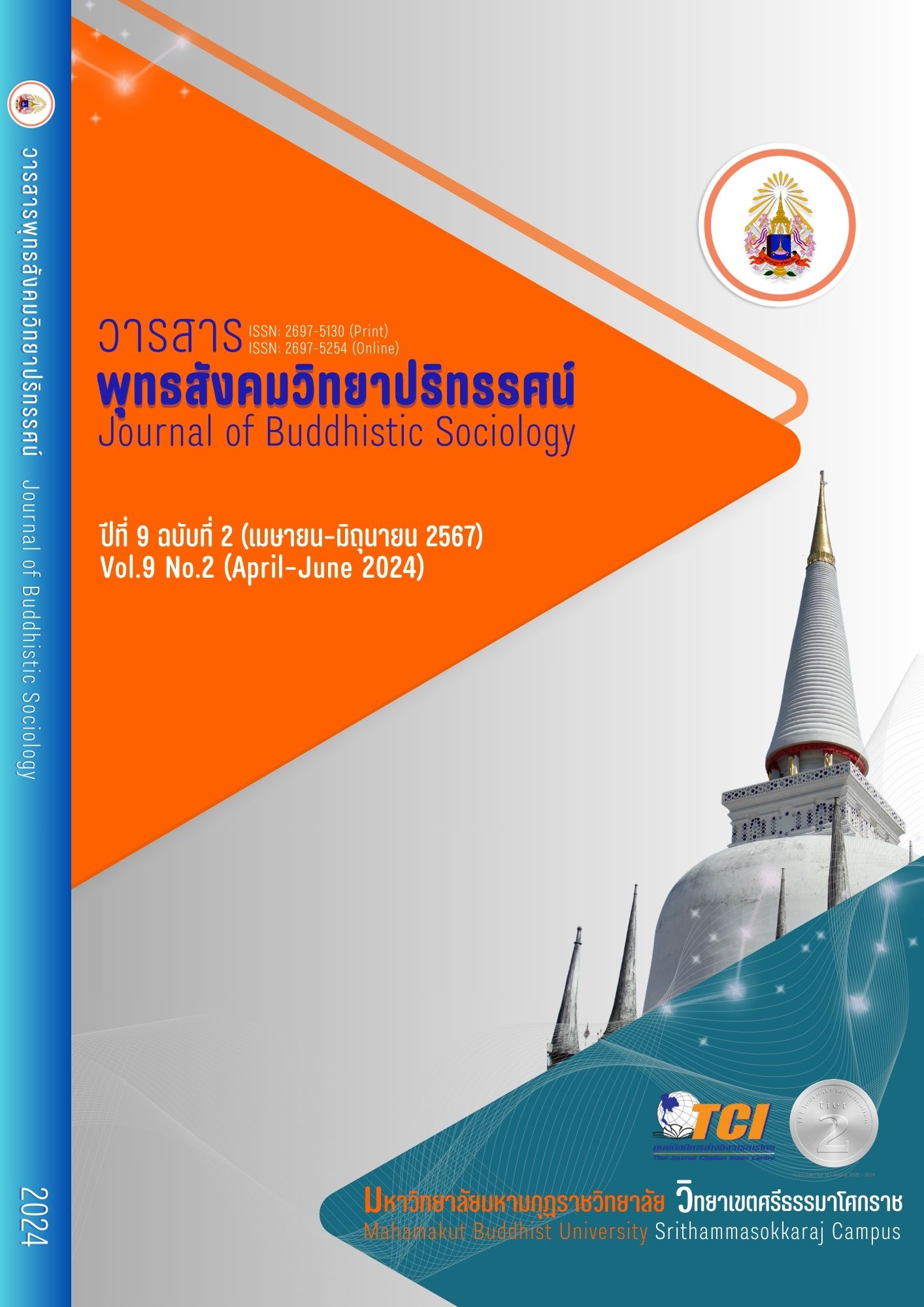BUDDHISM AND MODERN SCIENCE
Main Article Content
Abstract
The academic article on Buddhism and Modern Science has the following objectives: 1) to study Buddhism and modern science, 2) to analyze Buddhism and modern science, and 3) to synthesize Buddhism and modern science. The results of the study found that the Knowledge system is a science that seeks knowledge and understanding that will help point the way in human life to know how to reach a good life and satisfy curiosity. Buddhism teaches humans to understand the actions of each human being and that it is a factor that causes humans to experience suffering or happiness differently. On the other hand, the science section focuses on developing skills to become proficient and proficient in seeking addictive things to satisfy curiosity. Science is only interested in searching and revealing the truth but not in seeking goodness. Buddhism for society has a goal of organizing the relationships of people in society through the refinement of those who follow the teachings. This is the way to bring religion to test, practice, and understand the doctrine through experience deep insight into the foundations of religious teachings to the point of solving new problems at the basic level of those problems, leading to action in terms of proposing principles to solve a severe problem or social movement to propose principles for solving that problem.
Article Details

This work is licensed under a Creative Commons Attribution-NonCommercial-NoDerivatives 4.0 International License.
References
บูรกรณ์ บริบูรณ์ และวิบูลย์ แมนสถิต. (2554). รูปแบบการนำตนเองเข้าไปผูกพันกับชุมชนของพระสงฆ์ในการแก้ไขปัญหาสังคม. กรุงเทพมหานคร: มหาจุฬาลงกรณราชวิทยาลัย.
พระธรรมโกศาจารย์ (ประยูร ธมฺมจิตฺโต). (2553). วิธีบูรณาการพระพุทธศาสนากับศาสตร์สมัยใหม่. กรุงเทพมหานคร: โรงพิมพ์มหาวิทยาลัยมหาจุฬาลงกรณราชวิทยาลัย.
พระพรหมคุณาภรณ์ (ป.อ.ปยุตฺโต). (2550). พุทธศาสนาในฐานะเป็นรากฐานของวิทยาศาสตร์ (พิมพ์ครั้งที่ 6). กรุงเทพมหานคร: สหธรรมิก.
พระพรหมบัณฑิต (ประยูร ธมฺมจิตฺโต). (2557). วิธีบูรณาการพระพุทธศาสนากับศาสตร์สมัยใหม่. กรุงเทพมหานคร: โรงพิมพ์มหาวิทยาลัยมหาจุฬาลงกรณราชวิทยาลัย.
พระไพศาล วิสาโล. (2546). พระพุทธศาสนาไทยในอนาคต. กรุงเทพมหานคร: มูลนิธิสดศรีสฤดิ์วงศ์.
พระมหามฆวินทร์ ปุริสุตฺตโม. (2561). พุทธศาสนากับศาสตร์สมัยใหม่. วารสารปัญญา, 25(1), 1-13.
พระมหาหรรษา ธมฺมหาโส. (2557). พระพุทธศาสนากับวิทยาการสมัยใหม่: ตัวแบบวิธีวิทยาว่าด้วยพุทธบูรณาการและพุทธสหวิทยาการ. เรียกใช้เมื่อ 10 กันยายน 2566, จาก http://center.mcu.ac.th/site/articlecontent_desc.php?article_id=1733&articlegroup_id=278
มหามกุฎราชวิทยาลัย. (2552). พระไตรปิฎกฉบับภาษาบาลี พร้อมอรรถกถา (ชุด 91 เล่ม) พระไตรปิฎก อรรถกถาแปล ฉบับครบรอบ 200 ปี แห่งราชวงศ์จักรี กรุงรัตนโกสินทร์ พุทธศักราช 2525 (พิมพ์ครั้งที่ 3). กรุงเทพมหานคร: โรงพิมพ์มหามกุฏราชวิทยาลัย.
มานพ นักการเรียน. (2545). พระพุทธศาสนากับศาสตร์สมัยใหม่. กรุงเทพมหานคร: มหาจุฬาลงกรณราชวิทยาลัย.
รจิตลักษณ์ แสงอุไร และคณะ. (2532). คลื่นโลกที่สาม. กรุงเทพมหานคร: อินหยาง.
รัตนะ บัวสนธ์. (2552). ปรัชญาวิจัย. กรุงเทพมหานคร: จุฬาลงกรณ์มหาวิทยาลัย.
ราชบัณฑิตยสถาน. (2542). พจนานุกรมฉบับราชบัณฑิตยสถาน พ.ศ. 2542. กรุงเทพมหานคร: นานมีบุ๊คส์พับลิเคชั่นส์.
หิมพรรณ รักแต่งาม. (2556). การวิเคราะห์การตีความหลักธรรมทางพระพุทธศาสนาของ ติช นัท ฮันห์. กรุงเทพมหานคร: มหาจุฬาลงกรณราชวิทยาลัย.


